Related Research Articles
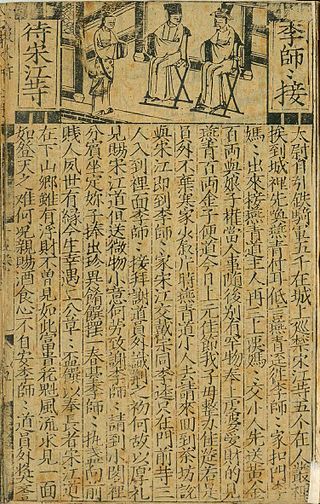
Water Margin is one of the earliest Chinese novels written in vernacular Mandarin,and is attributed to Shi Nai'an. It is also translated as Outlaws of the Marsh and All Men Are Brothers.

Bao Zheng,commonly known as Bao Gong,was a Chinese politician during the reign of Emperor Renzong in China's Song Dynasty. During his twenty-five years in civil service,Bao was known for his honesty and uprightness,with actions such as impeaching an uncle of Emperor Renzong's favourite concubine and punishing powerful families. His appointment from 1057 to 1058 as the prefect of Song's capital Kaifeng,where he initiated a number of changes to better hear the grievances of the people,made him a legendary figure. During his years in office,he gained the honorific title Justice Bao due to his ability to defend peasants and commoners against corruption or injustice. Bao Zheng is depicted as the incarnation of the Astral God of Civil Arts,while another protagonist —famous Northern Song warrior Di Qing as the Astral God of Military Arts.

Cat Vs. Rat is a 1982 Shaw Brothers martial arts-comedy film directed by Lau Kar Leung,starring Alexander Fu,Adam Cheng,Kara Hui,and Hsiao Ho. The plot is loosely based on the 19th century wuxia classic novel The Seven Heroes and Five Gallants.

Lu Fang is a fictional Song dynasty hero from the 19th-century Chinese novels The Seven Heroes and Five Gallants and The Five Younger Gallants. He is nicknamed "Sky Rat" or "Sky-Penetrating Rat" (鑽天鼠) for his mast-climbing skills.

The Tale of Loyal Heroes and Righteous Gallants (忠烈俠義傳),also known by its 1883 reprint title The Three Heroes and Five Gallants (三俠五義),is an 1879 Chinese novel based on storyteller Shi Yukun's oral performances. The novel was later revised by philologist Yu Yue and republished in 1889 under the title The Seven Heroes and Five Gallants (七俠五義),with the story essentially unaltered.

Bai Yutang,nicknamed "Sleek Rat" or "Brocade-Coated Rat" (錦毛鼠),is a fictional Song dynasty knight-errant from the 19th-century Chinese novel The Seven Heroes and Five Gallants.
Shan Chuanzhong,better known by stage name Shan Tianfang,was a Chinese pingshu performer. He was a member of the third batch of national intangible cultural heritage inheritors,a member of Chinese Ballad Singers Association and a member of China Society for Literature Popular Research. His language in pingshu performances was relatively plain,and he specialized in presenting the images,colors and emotions with sound impressions. Since the mid-1990s,his storytelling video shows have been broadcast on TV stations like CCTV.
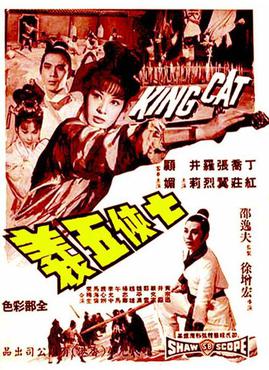
King Cat is a 1967 Hong Kong martial arts film directed by Hsu Tseng Hung and produced by Shaw Brothers Studio. The story is loosely based on the 19th-century Chinese novel The Seven Heroes and Five Gallants. The title refers to a nickname of the protagonist Zhan Zhao.

Han Zhang is a fictional Song dynasty knight-errant from the 19th-century Chinese novels The Seven Heroes and Five Gallants and The Five Younger Gallants. Nicknamed "Earth Rat" or "Earth-Piercing Rat" (徹地鼠) for his expertise in land mines,he has a military background.

Jiang Ping,courtesy name Zechang,is a fictional Song dynasty knight-errant from the 19th-century Chinese novels The Seven Heroes and Five Gallants and The Five Younger Gallants. Nicknamed "River Rat" or "River-Overturning Rat" (翻江鼠) for his amazing swimming and freediving skills,he is able to stay underwater seemingly forever. He is the fourth sworn brother of the "Five Rats",whose other members are Lu Fang,Han Zhang,Xu Qing and Bai Yutang.
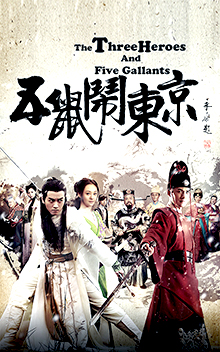
The Three Heroes and Five Gallants is a 2016 Chinese television series produced by Huayi Brothers with Tianxing Yiyuan Entertainment (天星亿源影视),based on the 19th-century classic novel of the same name. Starring Chen Xiao,Yan Yikuan and Zheng Shuang,the series premiered on February 17,2016,on Anhui TV.

The Three Heroes and Five Gallants is a 1991 Chinese television series produced by Shanghai Cable Drama Television,based on the 19th-century classic novel of the same name. It is considered the most faithful adaptation of the novel.

The Seven Heroes and Five Gallants is a 1994 Taiwanese television series produced by Chinese Television System (CTS) a few months after its prequel Justice Pao,which was also produced by Chao Ta-shen. Dozens of actors appeared in both series,but only Sze Yu and Tu Man-sheng reprised their roles. Fan Hung-hsuan and Lung Lung chose to portray new characters rather than their iconic roles.
Zidishu,translated as Bannerman Song or Scion Book,was a popular Chinese folk ballad song during the Qing dynasty (1644–1912),mostly composed and performed by Manchu people. It flourished between 1736 and 1850 and began to decline at the end of the 19th century. In the 18th century,it was considered one of the most elegant popular northern,Beijing-based Chinese songs.
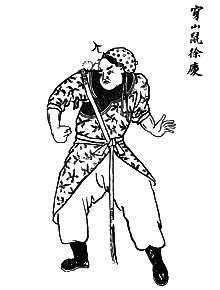
Xu Qing,nicknamed "Mountain Rat" or "Mountain-Boring Rat" (穿山鼠),because he can quickly traverse mountain caves,is a fictional Song dynasty knight-errant from the 19th-century Chinese novels The Seven Heroes and Five Gallants and The Five Younger Gallants. Xu Qing is the third sworn brother of the "Five Rats",whose other members are Lu Fang,Han Zhang,Jiang Ping and Bai Yutang.
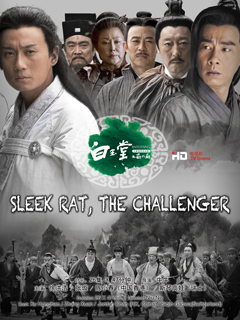
Sleek Rat,the Challenger is a 2013 Chinese wuxia-mystery television drama series based on Tan Ge's (谈歌) 2006 novel The New Legend of Bai Yutang (新白玉堂傳奇). The show stars Xu Honghao as the "Sleek Rat" Bai Yutang,a superb knight-errant during the 11th-century Song dynasty. Many characters come from either the 19th-century novel The Seven Heroes and Five Gallants or the Generals of the Yang Family legends,but the story is completely new.
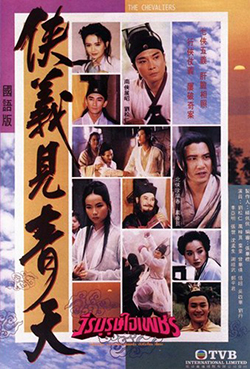
The Chevaliers is a 1994 Taiwanese television drama series produced by Young Pei-pei,first aired on Taiwan Television. Produced in conjunction with Hong Kong's TVB,it's believed to be the Taiwanese drama starring the most number of Hong Kong stars,like Damian Lau,Alex Man,Cecilia Yip,Maggie Shiu,Margie Tseng,Lau Dan,Eddie Kwan,and Lawrence Ng.
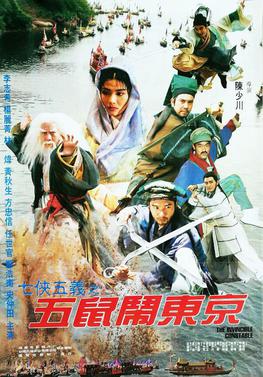
The Invincible Constable is a 1993 Chinese-Taiwanese martial arts comedy film directed by Hong Kong director Chan Muk-chuen,based on the 19th-century novel The Seven Heroes and Five Gallants. The film was shot in Dajinhu National Geopark (大金湖国家地质公园) in Taining County,Fujian,a protected area of China.
The Five Younger Gallants (小五義) is an 1890 Chinese novel and the best known sequel to the hugely popular 1879 novel The Tale of Loyal Heroes and Righteous Gallants. It is followed a year later by Sequel to the Five Younger Gallants (續小五義). Both sequels were published by Shi Duo (石鐸) who owned the Beijing publisher Wenguang lou (文光樓). The editor was a "Captivated-Wind Daoist" (風迷道人). It's unknown whether he was the same person as "Captivated Daoist" (入迷道人),an editor of the 1879 novel.
References
- 1 2 Keulemans , pp. 65–66.
- ↑ "石玉昆" [Shi Yukun]. National Digital Culture Network (China) (in Chinese). 2003-08-29.
- ↑ Keulemans , p. 28.
- ↑ Keulemans , p. 82.
- ↑ Keulemans , pp. 83 & 88.
- ↑ Blader , p. xxiv.
- ↑ Blader , pp. xv–xvi.
- ↑ Blader , p. xxi.
- ↑ Deng & Wang , p. 13.
- ↑ Keulemans , p. 165.
- ↑ Keulemans , p. 166.
- ↑ Blader , p. xvii.
- ↑ Lu Hsun; Yang Hsien-yi (trans.); Gladys Yang (trans.) (1964). A Brief History of Chinese Fiction (2nd ed.). Beijing: Foreign Languages Press. ISBN 1135430608.
- Blader, Susan (1998). Tales of Magistrate Bao and His Valiant Lieutenants: Selections from Sanxia Wuyi. The Chinese University Press. ISBN 962-201-775-4.
- Deng Shaoji; Wang Jun; (trans. Wen Jingen) (1997). "Preface". The Seven Heroes and Five Gallants. Chinese Literature Press. ISBN 7-5071-0358-7.
- Keulemans, Paize (2014). Sound Rising from the Paper: Nineteenth-Century Martial Arts Fiction and the Chinese Acoustic Imagination. Harvard University Asia Center. ISBN 978-0-674-41712-0.